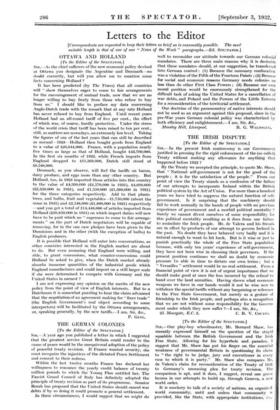Letters to the Editor
[Correspondents are requested to keep their letters as brief as is reasonably possible. The most suitable length is that of one of our " News of the Week " paragraphs.—Ed. SPECTATOR.] OTTAWA AND HOLLAND [To the Editor of the SPECTATOR.]
SIR,—As the chief sufferers of the new economic policy devised at Ottawa you designate the Argentine and Denmark—no doubt correctly, but will you allow me to mention some facts concerning Holland ?
It has been predicted (by The Times) that all countries will " show themselves eager to come to fair arrangements for the encouragement of mutual trade, now that we are no longer willing to buy freely from those who refuse to buy from us." I should like to preface my data concerning Anglo-Dutch trade with the remark that at any rate Holland has never refused to buy from England. Until recent years. Holland had an all-round tariff of five per cent., the effect of which was, of course, hardly protective. Under the stress of the world crisis that tariff has been raised to ten per cent., still, as matters are nowadays, an extremely low level. Taking the figures of one of the last years that can still be described as normal-1928—Holland then bought goods from England to a value of £26,644,000. France, with a population nearly five times as large as that of Holland, bought £43,700,000. In the first six months of 1932, while French imports from England dropped to £11,369,000, Dutch still stood at £8,548,000.
Denmark, as you observe, will feel the tariffs on bacon, dairy produce, and eggs more than any other country. But Holland, too, in 1928 imported those articles into this country to the value of £4,300,000 (12,570,000 in 1931), £4,600,000 (13,350,000 in 1931), and £1,550,000 (£1,380,000 in 1931) for the three categories respectively. Add to that plants trees, and bulbs, fruit and vegetables—£1,750,000 (about the same in 1931) and £2,548,000 (£1,800,000 in 1931) respectively —and you get a total of £14,448,000 of articles imported from Holland (110,850,000 in 1931) on which import duties will now have to be paid which no " eagerness to come to fair arrange- ments " on the part of Dutch negotiators will be capable of removing, for in the one case pledges have been given to the Dominions and in the other (with the exception of bulbs) to English producers.
It is possible that Holland will enter into conversations, as other countries interested in the English market are about to do. But even assuming that England were willing, and able, to grant concessions, what counter-concessions could Holland be asked to give, when the Dutch market already absorbs immense quantities of the industrial goods which England manufactures and could import on a still larger scale if she were determined to compete with Germany and the United States in earnest ?
I am not expressing any opinion on the merits of the new policy from the point of view of English interests. But to a Dutchman it is somewhat puzzling to hear the claim advanced that the negotiation of an agreement making for "freer trade" (the English Government's real object according to some interpreters) will be facilitated by the Ottawa arrangements, or, speaking generally, by the new tariffs.—I am, Sir, &c., P. GEYL.






























 Previous page
Previous page